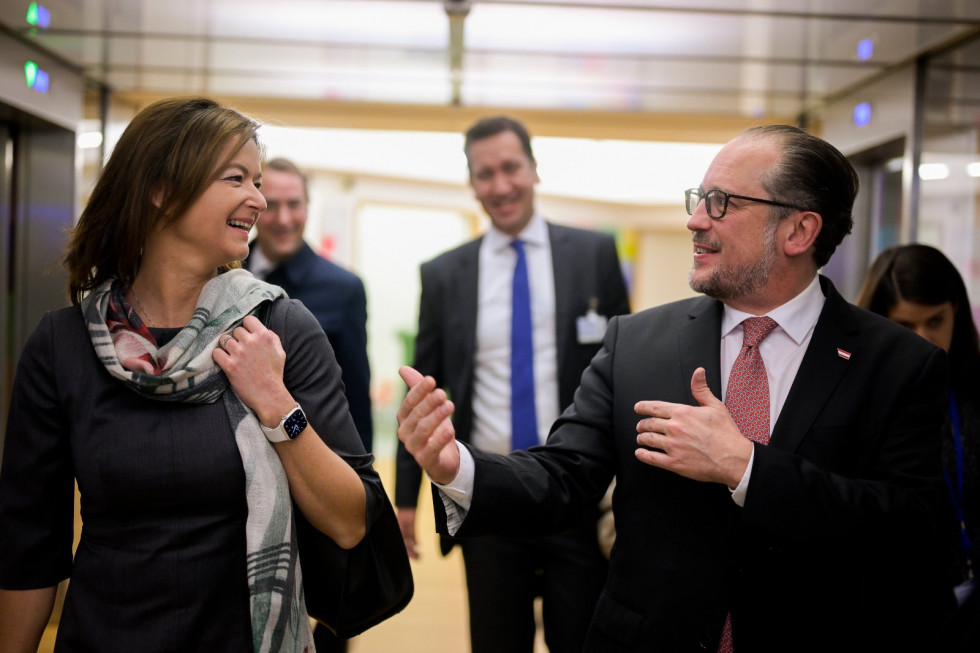EU Foreign Affairs Council on Russia’s aggression against Ukraine, the Great Lakes region and the Western Balkans
- Ministry of Foreign Affairs
- Permanent Representation to the European Union Brussels

Minister Fajon and Austrian Foreign Minister Schallenberg | Author Ministrstvo za zunanje zadeve Republike Avstrije
Prior to the official opening, EU foreign ministers held an informal meeting with Belarus opposition leader Sviatlana Tsikhanouskaya. “I assured her of Slovenia’s support for her efforts toward a democratic Belarus. The situation is extremely difficult and dangerous. I admire her courage and fight, which is paving the way for a free country where civil society and fundamental human rights will be given their rightful place”, Minister Fajon said on the margins of the meeting.
The ministers continued the discussion on the broader impacts of Russia’s aggression against Ukraine, concentrating on future relations with Russia. They adopted a decision to launch the European Union Military Assistance Mission (EUMAM). “Slovenia welcomes the timely establishment and launch of the EU Mission for Ukraine. We intend to take part in its command structure and training activities. Slovenia will continue to support the country to the best of its ability. Our goal is clear: to provide continued support for Ukraine and support efforts to restore peace as soon as possible”, the Minister emphasised.
In the discussion on the Western Balkans, the ministers exchanged views on the developments in the region, particularly given the need to strengthen cybersecurity and provide assistance to the region, which has been hit hard by the impacts of the war in Ukraine. “We are actively building the resilience of our Western Balkans partners. A concrete example of such endeavours is the establishment of the Regional Cyber Security Centre in Montenegro following the joint initiative of Slovenia and France, which will become operational in early 2023”. Minister Fajon also recalled the unstable situation in the region and the changed geopolitical dynamics and responsibilities of the EU. “Granting candidate status to Bosnia and Herzegovina in December, which Slovenia strongly supports, would be a much needed positive signal for the whole region. It is also imperative to address instabilities in Kosovo and Montenegro”, the Minister added.
The debate on the Great Lakes region (Democratic Republic of Congo, Uganda, Rwanda and Burundi), which is experiencing one of the worst humanitarian crises in the world, was dedicated to developing a renewed approach to the EU’s engagement in the region. The central issue is natural resources management, both in terms of instability in the region and its strategic significance for the EU economy. The ministers underlined the importance of regional and cross-border cooperation in ensuring peace and security and fostering the values of sustainable development – taking into consideration local added values in natural resources management. Minister Fajon welcomed the proposal for a renewed approach and the development of a new strategy on the Great Lakes region.
Slovenia praised and expressed support for the Council’s draft conclusions on women, peace and security. Together with Germany, Portugal and the Benelux countries, Slovenia has contributed to a document underlining the need to respect gender equality and the protection of women’s rights worldwide in numerous complex security issues. “Women – mothers, sisters, daughters, teachers, trainers and members of CSDP missions around the globe – take the role of mediators and strive to restore peace. Women’s inclusion and full adherence to the Women, Peace and Security Agenda are key for shaping a better future. If elected as a non-permanent member of the Security Council for the 2024–2025 term, Slovenia will make this a priority”, Minister Fajon declared.

